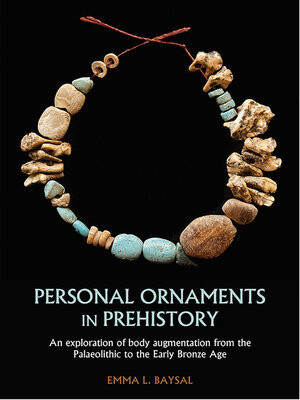Personal Ornaments in Prehistory
ebook ∣ An exploration of body augmentation from the Palaeolithic to the Early Bronze Age
By Emma L. Baysal

Sign up to save your library
With an OverDrive account, you can save your favorite libraries for at-a-glance information about availability. Find out more about OverDrive accounts.
Find this title in Libby, the library reading app by OverDrive.



Search for a digital library with this title
Title found at these libraries:
| Library Name | Distance |
|---|---|
| Loading... |
Beads, bracelets, necklaces, pendants and many other ornaments are familiar objects that play a fundamental role in personal expression and communication. This book considers how and why the human relationship with ornaments developed and continued over tens of thousands of years, from hunter-gatherer life in the cave to urban elites, from expedient use of natural resources to complex technologies.
Using evidence from archaeological sites across Turkey, the Near East and the Balkans, it explores the history of personal ornaments from their appearance in the Palaeolithic until the rise of urban centers in the Early Bronze Age and encompassing technologies ranging from stone cutting to early glazing, metallurgy and the roots of glass manufacture. The development of theoretical and practical approaches to ornaments and the current state of research are illustrated with a wide variety of examples.
This book shows that far from being objects of display, of little value in archaeological interpretation and often overlooked, these artifacts are key to understanding trade, relationships, values, beliefs and the construction of personal identity in the past. Indeed, more than any other group of artifacts, their variety in material, form, use and distribution opens doors to both wide ranging scientific exploration and consideration of what it is to be human.
Using evidence from archaeological sites across Turkey, the Near East and the Balkans, it explores the history of personal ornaments from their appearance in the Palaeolithic until the rise of urban centers in the Early Bronze Age and encompassing technologies ranging from stone cutting to early glazing, metallurgy and the roots of glass manufacture. The development of theoretical and practical approaches to ornaments and the current state of research are illustrated with a wide variety of examples.
This book shows that far from being objects of display, of little value in archaeological interpretation and often overlooked, these artifacts are key to understanding trade, relationships, values, beliefs and the construction of personal identity in the past. Indeed, more than any other group of artifacts, their variety in material, form, use and distribution opens doors to both wide ranging scientific exploration and consideration of what it is to be human.







